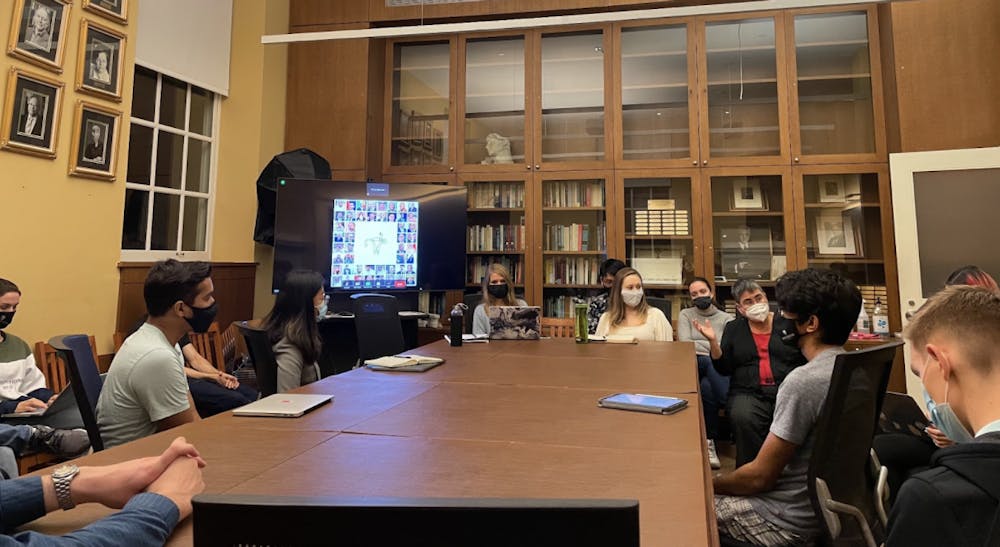The newly-formed Undergraduate History Association (UHA) held its first event, a discussion titled “Abortion: An Issue Through Time,” on Oct. 25. The panel featured History of Medicine Professor Mary Fissell, Visiting Assistant Professor of History Victoria Harms and Brooke Lansing, a PhD candidate in the Department of History.
Throughout the event, the panelists emphasized that the concept of abortion is not a recent phenomenon.
“Women have always terminated pregnancies. That’s not going to change no matter what law they have,” Fissell said. “The question is safety and efficacy.”
Freshman Thành Đoàn, who attended the event, felt that the panelists presented connections to contemporary topics that made the topic feel more relevant. He shared with The News-Letter that the event encouraged him to reframe his approach to the topic.
“Instead of focusing on whether abortion should be legal, maybe we should shift the question [to] ‘How do we make abortions a safe procedure for more people?’” he said.
The panelists argued that because abortion is not as novel as some might claim, it is especially important to examine its history in order to contextualize debates about the procedure in today’s political climate. Fissell suggested that the advantage of looking at the past is that it helps to frame questions about the present.
Harms described how history can inform and instruct present-day decision-making.
“I don’t think history can repeat itself, but it can definitely inform and instruct our decision-making right now and in the future,” she said. “We will be more informed citizens and make more qualified decisions if we are aware of other historical examples and international comparisons.”
Harms also recognized the lack of racial diversity on the panel, noting that the panelists bring only a narrow sample of points of view.
Freshman Nina Li, who attended the event, appreciated this acknowledgment.
“Instead of trying to generalize their studies to other demographics, I thought it was very knowledgeable, very mature and also very inclusive of them to do,” she said. “That atmosphere where it's just a discussion amongst undergraduate students, graduate students and professors was really welcoming.”
Lansing pointed out the differences in resistance for white women and Black women, particularly during slavery.
“When enslaved people were resisting having a child, they were resisting publicly enforced breeding. It wasn’t just about freedom of their body for them,” she said. “There was an economic value to their reproduction that’s not necessarily attached to white women.”
Concerning the ongoing debate about recent changes to Texas’s abortion laws, Lansing explained her own research on a woman who performed abortions named Madame Restell.
“In the mid-1840s, the police were stationed outside [Restell’s] home and watching for who would come in and out,” she said. “There’s this horrible theme of surveillance across abortion, and I think of women in Texas and how hard it would be to trust anyone in this situation.”
Lansing added that for women of color, these changes will have more serious consequences.
“Women of color are going to be watched and pursued a lot more than white women are,” she said. “They’re going to lose in court a lot more than white women are.”
In favor of abortion rights, Harms pointed to sexual health in Romania. Romania has banned sex education and limits access to contraceptives. As a result, abortion has become a primary means of family planning; in 2004, 46% of reported pregnancies were terminated.
“Abortion is not just about reproductive rights,” Harms said. “It’s also about access to resources.”
Senior Jasmine Dong, president of the Undergraduate History Association, argued that discussing abortion through a historical lens can be more illustrative than a debate.
“Showing people the actual real-life impact of these things [in history] can change people’s opinion in ways that your argument of ‘I’m right’ is never going to,” she said.
In an interview with The News-Letter, Fissell remarked that many Hopkins students have limited perspectives on topics like abortion.
“Some students at Hopkins come from a relatively privileged background, and because their experience of life is not that big yet, they may find it hard to imagine the circumstances in which some women find themselves in,” she said.
Lansing agreed, suggesting that there should be a greater emphasis on social sciences and humanities in pre-med curriculum. The humanities and social sciences are often overlooked in terms of their relevance, she said.
“[The pre-med population] learn so much about science and chemistry and biology. But there are more human or even emotional aspects to the practice of medicine that are important to be aware of,” she said. “History really has that power to develop practitioners' empathy for patients, and really think critically about those interactions and how they want to relate to the people they're helping.”





